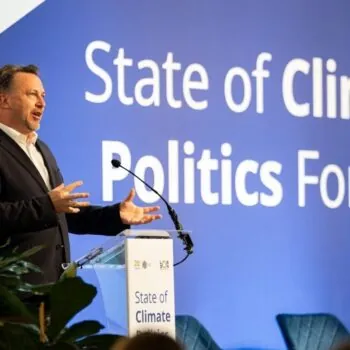20 years after presiding over the first ever COP in Berlin, Angela Merkel has to defend her legacy: her international reputation as the Climate Chancellor needs to be matched by domestic policies.
In June this year, as a host of the G7 Summit, Merkel was willing to confront difficult countries and partners over their stance on climate policy. She managed to create consensus on numerous fronts – the decarbonisation of the global economy over the course of the century, the transformation of their energy sectors by 2050, and their commitment to develop long-term national low-carbon strategies. Her leadership was instrumental in creating climate risk insurance for up to 400 million people in the most vulnerable developing countries by 2020. The message to the international community was clear: the German chancellor is willing to show leadership on climate again.
She is well placed to do that. Germany’s commitment to the Energiewende has inspired others to follow suit and invest in renewable energy because of the economic case – not because they are pursuing ambitious climate policies. The examples of China, India, and the US show that other countries can see value in renewable energy, but are nonetheless finding it hard to lead on climate internationally, be it for ideological, economic, or domestic political reasons (as in the case of the US). The burden of leadership seems to be on the “reluctant power” Germany.
In the last few days before the start of the COP Merkel’s tone has been more cautious than back in Elmau. She emphasised the need for a binding follow-up mechanism of the Paris agreement to call the climate summit a success. This would create a pathway; it would constitute “a start”. Behind the scenes, German negotiators are working hard to win over other more reticent countries and to gain their support for a robust and binding agreement. But Merkel herself has not come out personally to rally the world behind a common cause in a time of political strife and upheaval. Her political room of manoeuvre is limited given domestic and European challenges around the refugee crisis, the return of terrorism on European soil, and Germany’s planned military involvement in Syria. This might explain Merkel’s caution at the European and international levels so far, but in Paris many eyes will be on her.
The same goes for the domestic situation. In stark contrast to Merkel’s international track record, her lack of domestic action is outright inexcusable. One of Germany’s best known dirty secrets is its continued reliance on coal. Coal is responsible for almost a third of Germany’s emissions. An ambitious plan to start a coal phase-out earlier this year failed due to a massive backlash from the industry, trade unions and the affected regions. The Chancellor did not intervene or offer to broker a long-term deal and a roadmap for the transition out of coal. Yet, this is the kind of action that will be required of all countries and, in particular, the G7 if they want to get real about decarbonising their power sectors and their entire economies. Climate action and the Energiewende are not merely about clever policy instruments and investment incentives. More than anything they are about political leadership.
Moreover, just before the start of the COP, Merkel conceded that Germany was lagging behind its own targets on e-mobility and energy efficiency. This is a bad sign given the enormity of the challenge Germany is embracing with the Energiewende. The transport and buildings sectors combined are responsible for almost 60% of the country’s emissions. Both sectors are ruled by powerful industries that resist any change. The German government under Chancellor Merkel has not been willing or able so far to break the gridlock they are imposing. However, if the government does not manage to extend the Energiewende beyond the power sector Germany will fail to deliver on its self-imposed emissions targets; Angela Merkel’s reputation as the Climate Chancellor will remain undeserved; the transformation of the German economy will not happen; and others will be quicker to reap the benefits of their transition to a low-carbon economy.
When Angela Merkel, as a young and unknown but highly able Environment Minister in the recently reunited Germany, presided over COP1 she gained an in-depth understanding of the dynamics of international climate policy and politics. Like hardly anybody else she will know that her leadership matters internationally. President Obama is an illustration of how a leader can make a difference – even though he may be hamstrung by his recalcitrant Congress. At least in his second term, Obama is willing to make climate action part of his political legacy and throw his political weight behind Paris. It is the personal involvement and commitment of political leaders that will make the difference. What’s more, whilst European and international solidarity is severely tested on many fronts, Paris is an opportunity to demonstrate unity and determination in the face of world politics at disarray. The former Climate Chancellor has to step up to the plate and show that leadership matters.



